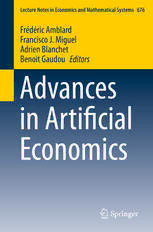Table Of ContentLecture Notes in Economics and Mathematical Systems 676
Frédéric Amblard
Francisco J. Miguel
Adrien Blanchet
Benoit Gaudou Editors
Advances
in Artificial
Economics
Lecture Notes in Economics
and Mathematical Systems 676
FoundingEditors:
M.Beckmann
H.P.Künzi
ManagingEditors:
Prof.Dr.G.Fandel
FachbereichWirtschaftswissenschaften
FernuniversitätHagen
Hagen,Germany
Prof.Dr.W.Trockel
MuratSertelInstituteforAdvancedEconomicResearch
IstanbulBilgiUniversity
Istanbul,Turkey
and
InstitutfürMathematischeWirtschaftsforschung(IMW)
UniversitätBielefeld
Bielefeld,Germany
EditorialBoard:
H.Dawid,D.Dimitrov,A.Gerber,C-J.Haake,C.Hofmann,T.Pfeiffer,
R.Slowin´ski,W.H.M.Zijm
Moreinformationaboutthisseriesat
http://www.springer.com/series/300
Frédéric Amblard (cid:129) Francisco J. Miguel (cid:129)
Adrien Blanchet (cid:129) Benoit Gaudou
Editors
Advances in Artificial
Economics
123
Editors
FrédéricAmblard FranciscoJ.Miguel
AdrienBlanchet LaboratoryforSocio-Historical
BenoitGaudou
Dynamics(LSDS)
UniversityToulouse1Capitole
UniversitatAutònomadeBarcelona
Toulouse
France CerdanyoladelVallès
Spain
ISSN0075-8442 ISSN2196-9957(electronic)
ISBN978-3-319-09577-6 ISBN978-3-319-09578-3(eBook)
DOI10.1007/978-3-319-09578-3
SpringerChamHeidelbergNewYorkDordrechtLondon
LibraryofCongressControlNumber:2014955224
©SpringerInternationalPublishingSwitzerland2015
Thisworkissubjecttocopyright.AllrightsarereservedbythePublisher,whetherthewholeorpartof
thematerialisconcerned,specificallytherightsoftranslation,reprinting,reuseofillustrations,recitation,
broadcasting,reproductiononmicrofilmsorinanyotherphysicalway,andtransmissionorinformation
storageandretrieval,electronicadaptation,computersoftware,orbysimilarordissimilarmethodology
nowknownorhereafterdeveloped.Exemptedfromthislegalreservationarebriefexcerptsinconnection
with reviews or scholarly analysis or material supplied specifically for the purpose of being entered
and executed on a computer system, for exclusive use by the purchaser of the work. Duplication of
this publication or parts thereof is permitted only under the provisions of the Copyright Law of the
Publisher’slocation,initscurrentversion,andpermissionforusemustalwaysbeobtainedfromSpringer.
PermissionsforusemaybeobtainedthroughRightsLinkattheCopyrightClearanceCenter.Violations
areliabletoprosecutionundertherespectiveCopyrightLaw.
Theuseofgeneraldescriptivenames,registerednames,trademarks,servicemarks,etc.inthispublication
doesnotimply,evenintheabsenceofaspecificstatement,thatsuchnamesareexemptfromtherelevant
protectivelawsandregulationsandthereforefreeforgeneraluse.
While the advice and information in this book are believed to be true and accurate at the date of
publication,neithertheauthorsnortheeditorsnorthepublishercanacceptanylegalresponsibilityfor
anyerrorsoromissionsthatmaybemade.Thepublishermakesnowarranty,expressorimplied,with
respecttothematerialcontainedherein.
Printedonacid-freepaper
SpringerispartofSpringerScience+BusinessMedia(www.springer.com)
Preface
The interactions between Computer Science and the Social Sciences have grown
fruitfullyalongthepast20 years.Themutualbenefitsofsuch a cross-fertilization
standaswellataconceptual,technologicalormethodologicallevel.Economicsin
particularbenefitedfrominnovationsin multi-agentsystemsin ComputerScience
leading to agent-based computational economics and in return the multi-agent
systems benefited for instance of economic researches related to mechanisms of
incentivesandregulationtodesignself-organizedsystems.
Created 10 years ago, in 2005 in Lille (France) by Philippe Matthieu and
his team, the Artificial Economics conference series reveals the liveliness of
the collaborations and exchanges among computer scientists and economists in
particular. The excellent quality of this conference has been recognized since its
inceptionand its proceedingshave been regularlypublishedin Springer’sLecture
Notes in Economicsand Mathematical Systems series. At about the same period,
theEuropeanSocialSimulationAssociationwascreatedanddecidedtosupportan
annual conference dedicated to computational approaches of the social sciences.
Both communities kept going alongside for the past ten years presenting evident
overlaps concerning either their approaches or their members. This year, both
conferenceshavedecidedtojointheireffortsandholdacommonconference,Social
SimulationConference,inBarcelona,Spain,1stto5thSeptember2014whichwill
hostthe10theditionoftheArtificialEconomicsConference.
Inthisedition,32submissionsfrom11countrieswerereceived,fromwhichwe
selected 20 for presentation (near 60 % acceptance). The papers have then been
revised and extended and 19 papers were selected in order to make part of this
volume.
We are very grateful to the authors of the submissions who providedthe basic
material of the conference, i.e. original and interesting research articles. We are
alsoverygratefultoallthemembersoftheProgramCommitteeandtheadditional
reviewersfortheirhardwork.ThanksarealsoduetoPaoloPellizari,AndreaTeglio,
v
vi Preface
Tim Verwaart and Friederike Wall (members of the AE Steering Committee) and
FlaminioSquazzoni(ESSAPresident).
Toulouse,France FrédéricAmblard
CerdanyoladelVallès,Spain FrancescJ.Miguel
Toulouse,France BenoitGaudou
Toulouse,France AdrienBlanchet
Summer2014
Acknowledgements
We would like to thank all the members of the Scientific Committee for their
participationintheselectionofenclosedpapers:
FrédéricAmblard(Chair)—IRIT,UniversitéToulouse1Capitole,France
SimoneAlfarano—UniversidadJaumeIdeCastellón,Spain
JavierArroyo—UniversityComplutensedeMadrid,Spain
BrunoBeaufils—LIFL,UniversitéLille1,France
DorisBehrens—Alpen-AdriaUniversität,Austria
OlivierBrandouy—UniversityofParis1,France
CharlotteBruun—AalborgUniversity,Denmark
AndreaConsiglio—UniversitàdegliStudidiPalermo,Italy
GiorgioFagiolo—ScuolaSuperioreSant’Anna,Italy
JoséManuelGalán—UniversidaddeBurgos,Spain
LynneHamill—UniversityofSurrey,UnitedKingdom
FlorianHauser—UniversitätInnsbruck,Austria
CesáreoHernández—UniversidaddeValladolid,Spain
JeanDanielKant—UniversityofParis6,France
StephanLeitner—Alpen-Adria-Universität,Klagenfurt,Austria
MarcoLicalzi—Università“Ca’Foscari”diVenecia,Italy
PhilippeMathieu—LIFL,UniversitéLille1,France
MishaelMilakovic—UniversityofBamberg,Germany
AkiraNamatame—NationalDefenseAcademy,Japan
SjoukjeOsinga—WageningenUniversity,TheNetherlands
PaoloPellizzari—Università“Ca’Foscari”diVenecia,Italy
MartaPosada—UniversidaddeValladolid,Spain
MarcoRaberto—UniversitàdiGenova,Italy
JulietteRouchier—CNRS,France
EnricoScalas—UniversitàdelPiemonteOrientale,Italy
KlausSchredelseker—UniversitätInnsbruck,Austria
FlaminioSquazzoni—UniversityofBrescia,Italy
AndreaTeglio—UniversidadJaumeIdeCastellón,Spain
vii
viii Acknowledgements
ElpidaTzafestas—UniversityofAthens,Greece
TimVerwaart—WageningenUniversity,TheNetherlands
FriederikeWall—Alpen-Adria-UniversitätKlagenfurt,Austria
MuratYildizoglu—Univ.MontesquieuBordeauxIV,France
Contents
Does Collaboration Pay? An Investigation for the Domain
ofDistributedInvestmentDecisions ................................................. 1
StephanLeitner,AlexanderBrauneis,andAlexandraRausch
WhyDoFirmsExist?................................................................. 15
VipinP.Veetil
The“Win-Continue,Lose-Reverse”RuleinCournotOligopolies:
RobustnessofCollusiveOutcomes................................................... 33
SegismundoS.IzquierdoandLuisR.Izquierdo
OrganizationalChangeforItsOwnSake? .......................................... 45
FriederikeWall
BestPracticesinProgrammingAgent-BasedModelsinEconomics
andFinance........................................................................... 57
A.VermeirandH.Bersini
BuildingArtificialEconomies:FromAggregateDatatoExperimental
Microstructure.AMethodologicalSurvey........................................... 69
Gianfranco Giulioni, Paola D’Orazio, Edgardo Bucciarelli,
andMarcelloSilvestri
SpontaneousSegregationofAgentsAcrossDoubleAuctionMarkets .............. 79
AleksandraAloric´,PeterSollich,andPeterMcBurney
TheJ-CurveandTransactionTaxes:InsightsfromanArtificialStock
Market ................................................................................ 91
LinaKalimullinaandRainerSchöbel
What Is the Impact of Heterogeneous Knowledge About
FundamentalsonMarketLiquidityandEfficiency:AnABM
Approach.............................................................................. 105
VivienLespagnolandJulietteRouchier
ix

